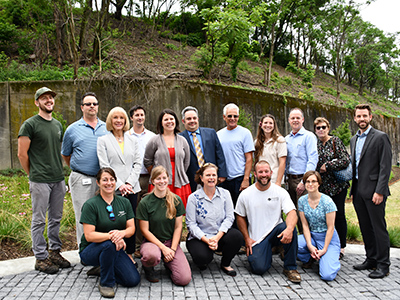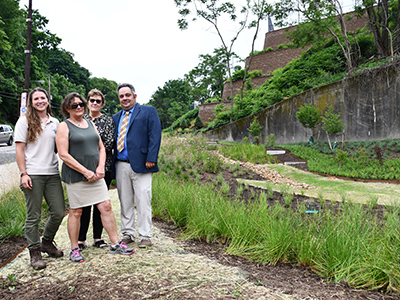Janet Thomas is passionate about gardening and loves the rush of watching plants grow and bloom. A former manager of a community garden in upstate New York, Janet moved to Pittsburgh’s Hill District in 2015. Sadly, her new home didn’t have adequate outdoor lighting or soil, making gardening nearly impossible.
 That’s when she noticed the Western Pennsylvania Conservancy’s community flower garden at the corner of Centre and Herron avenues about one mile from her new home.
That’s when she noticed the Western Pennsylvania Conservancy’s community flower garden at the corner of Centre and Herron avenues about one mile from her new home.
“I saw construction workers in the garden and I was very curious,” said Janet. “I also noticed there was a nightmare of erosion along the garden’s hillside. But I found out that they were working on fixing exactly that!”
Janet was witnessing the beginning stages of a new bioswale installed within WPC’s community garden in the Hill District. A bioswale is a trench added to a natural landscape that slows stormwater runoff, allowing it to filter and be absorbed into the ground instead of rushing into roadways and sewer drains.
For many Pittsburgh residents, ponding, flooding and sewer overflows after heavy rain events are a common occurrence. Pittsburgh’s Hill District neighborhood is no different.
The Conservancy’s community flower garden is flanked by two steep slopes located at the intersection of Centre and Herrons avenues, making the location ideal for stormwater drainage solutions.
“I’ve noticed flooding at this intersection before,” explains Janet. “It’s essentially a basin at the intersection.”
In 2014, the Conservancy performed site analyses for three existing community gardens to identify opportunities for stormwater capture using green infrastructure strategies, such as bioswales and rain gardens.
“Thanks to a Google Community grant, we identified the Centre and Herron garden as having the largest potential for rain capture,” explains Art DeMeo, director of community greenspace services at the Conservancy.
The City of Pittsburgh and the Pittsburgh Water and Sewer Authority (PWSA) also identified the Hill District as a priority area for green infrastructure solutions in its Citywide Green First Plan. With funding from PWSA and additional support from ALCOSAN’s GROW Grant program, the Conservancy joined PWSA to complete the 585-linear-foot bioswale last month.
“We’re so happy to expand this garden to not only beautify the neighborhood, but also provide long-term stormwater prevention,” said DeMeo.
More than 200 local volunteers joined the Conservancy in completing the greening for the bioswale, which included planting more than 13,000 perennials, 87 shrubs and 25 trees over the 1.2 acre site. Along with an underground storage tank, inlets and other infrastructure, rocks, soil and plant roots will help to slow and filter the stormwater runoff.
The Conservancy will continue to maintain the landscaping and garden at the Centre and Herron bioswale with Janet’s help.

Janet now receives her gardening “fix,” serving as a volunteer garden steward at the Centre and Herron bioswale. Garden stewards help provide weekly maintenance at each community flower garden. WPC relies on garden stewards to tend a garden once it is planted and keeps it looking beautiful throughout the growing season.
“This is a positive project for the area,” said Janet “My hope is to get some of my neighbors and their kids involved in the garden. You really get a sense of ownership and pride. It’s beautiful.”
We still need more help with the Centre and Herron bioswale. If you’d like to join Janet as a garden steward, please contact Lynn McGuire-Olzak at 412-586-2324 or LMcGuire-Olzak@paconserve.org.
